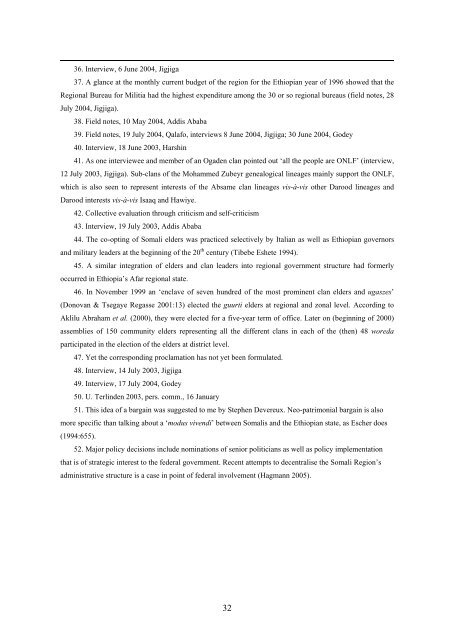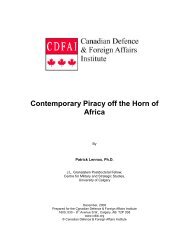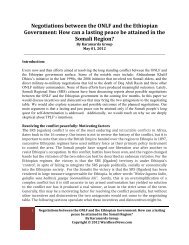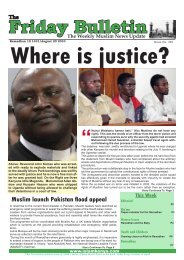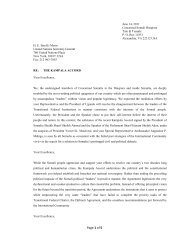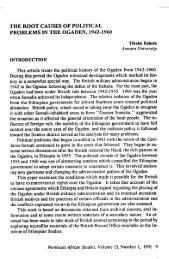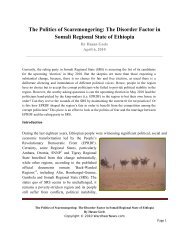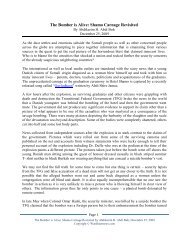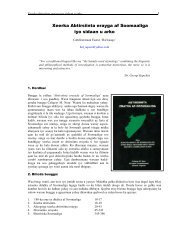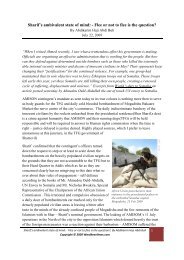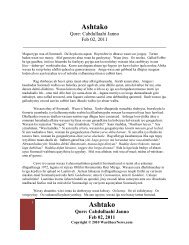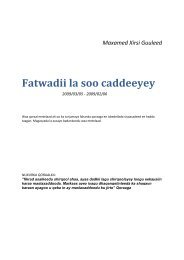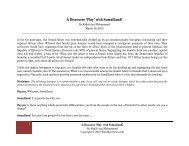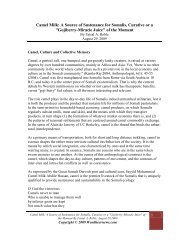View - WardheerNews
View - WardheerNews
View - WardheerNews
You also want an ePaper? Increase the reach of your titles
YUMPU automatically turns print PDFs into web optimized ePapers that Google loves.
36. Interview, 6 June 2004, Jigjiga<br />
37. A glance at the monthly current budget of the region for the Ethiopian year of 1996 showed that the<br />
Regional Bureau for Militia had the highest expenditure among the 30 or so regional bureaus (field notes, 28<br />
July 2004, Jigjiga).<br />
38. Field notes, 10 May 2004, Addis Ababa<br />
39. Field notes, 19 July 2004, Qalafo, interviews 8 June 2004, Jigjiga; 30 June 2004, Godey<br />
40. Interview, 18 June 2003, Harshin<br />
41. As one interviewee and member of an Ogaden clan pointed out ‘all the people are ONLF’ (interview,<br />
12 July 2003, Jigjiga). Sub-clans of the Mohammed Zubeyr genealogical lineages mainly support the ONLF,<br />
which is also seen to represent interests of the Absame clan lineages vis-à-vis other Darood lineages and<br />
Darood interests vis-à-vis Isaaq and Hawiye.<br />
42. Collective evaluation through criticism and self-criticism<br />
43. Interview, 19 July 2003, Addis Ababa<br />
44. The co-opting of Somali elders was practiced selectively by Italian as well as Ethiopian governors<br />
and military leaders at the beginning of the 20 th century (Tibebe Eshete 1994).<br />
45. A similar integration of elders and clan leaders into regional government structure had formerly<br />
occurred in Ethiopia’s Afar regional state.<br />
46. In November 1999 an ‘enclave of seven hundred of the most prominent clan elders and ugaszes’<br />
(Donovan & Tsegaye Regasse 2001:13) elected the guurti elders at regional and zonal level. According to<br />
Aklilu Abraham et al. (2000), they were elected for a five-year term of office. Later on (beginning of 2000)<br />
assemblies of 150 community elders representing all the different clans in each of the (then) 48 woreda<br />
participated in the election of the elders at district level.<br />
47. Yet the corresponding proclamation has not yet been formulated.<br />
48. Interview, 14 July 2003, Jigjiga<br />
49. Interview, 17 July 2004, Godey<br />
50. U. Terlinden 2003, pers. comm., 16 January<br />
51. This idea of a bargain was suggested to me by Stephen Devereux. Neo-patrimonial bargain is also<br />
more specific than talking about a ‘modus vivendi’ between Somalis and the Ethiopian state, as Escher does<br />
(1994:655).<br />
52. Major policy decisions include nominations of senior politicians as well as policy implementation<br />
that is of strategic interest to the federal government. Recent attempts to decentralise the Somali Region’s<br />
administrative structure is a case in point of federal involvement (Hagmann 2005).<br />
32


